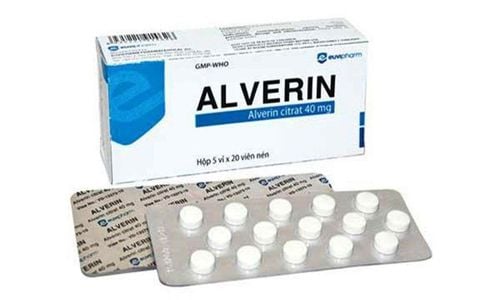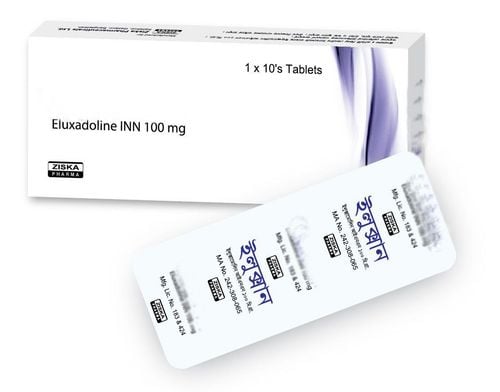This is an automatically translated article.
Irritable bowel syndrome is a common disorder affecting the colon. This is a chronic condition with manifestations such as spasms, abdominal pain, abdominal distension, bloating, constipation, diarrhea,...
1. What is irritable bowel syndrome? Irritable bowel syndrome (IBS) is also known as spastic colitis. These are functional disorders of the colon, which recur over and over again. When the patient was examined, no physical damage to the intestine was detected (anatomically, biochemically, and structurally). Although this syndrome is not life-threatening, it greatly affects the patient's life, creating anxiety and causing physical weakness.
Common symptoms in patients with irritable bowel syndrome are:
Abdominal pain, appearing after eating, mainly pain in the lower abdomen and left iliac fossa, pain relieved after defecation or defecation; Loose stools: Diarrhea about 3-5 times/day, loose or broken stools, maybe with mucus but no blood in the stools; Solid defecation: Constipation, small amount of stool, possibly mixed with mucus, alternating with diarrhea; Abdominal distention: Symptoms are severe during the day, especially after lunch, and decrease at night. In most cases, this is a chronic condition, symptoms can improve, get worse, or go away completely, but then still come back.

Hội chứng ruột kích thích IBS (Irritable bowel syndrome) còn gọi là viêm đại tràng co thắt
2. Why Irritable Bowel Syndrome? Why Irritable Bowel Syndrome? It is not yet clear what causes this condition. However, experts believe that the wrong interaction between the brain and the digestive tract can cause abnormal contractions in the colon, leading to diarrhea or constipation. In addition, many patients with IBS have an abnormally sensitive colon.
Factors that trigger this syndrome may include:
Food: Many patients have symptoms worse after eating certain foods such as: Cabbage, broccoli, milk, chocolate, spices, beans, carbonated drinks, alcohol,...; Stress: Most people with irritable bowel syndrome will find their symptoms worsen or appear more frequently during periods of intense psychological stress. However, stress can only make symptoms worse, not the cause of this syndrome; Hormones: Women are twice as likely to have irritable bowel syndrome than men (due to hormones). Many women notice worse symptoms during or before/after their period; Some other diseases: Gastroenteritis, intestinal dysbacteriosis, ... can also lead to this syndrome. People prone to irritable bowel syndrome include:
Young people: This syndrome tends to be common in people under 45 years of age; Women: The incidence rate is 2 times higher than that of men; Have a family history of IBS. This cause may be due to genes or living factors in the family; Have mental health problems: Depression, anxiety, history of childhood sexual abuse, domestic violence, etc.
3. Diagnostic methods for irritable bowel syndrome If you constantly change your bowel habits or have symptoms of irritable bowel syndrome, you should see a doctor for early detection. Diagnosis is mainly based on history and clinical examination.
Because there is no physical evidence to diagnose IBS, the doctor will make a diagnosis based on the following 2 sets of criteria:
Rome Criteria: The patient must have a number of symptoms before being diagnosed by a doctor. The important symptom is abdominal pain, discomfort lasting at least 3 days/month in the last 3 months, combined with 2 symptoms are increased frequency of defecation, change in stool consistency; Manning Criteria: Focused on pain relief after bowel movements, incomplete bowel movements, mucus in stools, and changes in stool consistency. The more symptoms you have, the higher your risk of irritable bowel syndrome. If you have symptoms such as: Onset after age 50, weight loss, fever, rectal bleeding, nausea or vomiting, abdominal pain, persistent diarrhea, iron deficiency anemia,... may recommend that the patient undergo additional testing. When additional examination, the patient may need to perform some tests such as: Diagnostic imaging (soft tube sigmoidoscopy, colonoscopy, X-ray, CT scan); testing for lactose intolerance; breath test; blood tests; stool test,...

Với trường hợp mắc hội chứng ruột kích thích mức độ trung bình hoặc nghiêm trọng, bệnh nhân có thể cần sử dụng thuốc
4. Treatments for Irritable Bowel Syndrome Since the root causes of IBS are not clear, the mainstay of treatment is to help relieve symptoms so that the person can lead a normal life. In most cases, you can manage mild symptoms by reducing stress, making dietary and lifestyle changes, avoiding trigger foods, exercising more, drinking plenty of fluids, and getting enough sleep. sleep. In the case of moderate or severe irritable bowel syndrome, the patient may need medication. Specific treatment directions are as follows:
Change in nutrition: Eliminate gluten (found in wheat, barley); eliminating food groups containing fermentable sugar FODMAPs (some grains, fruits, vegetables and dairy products); slowly increase the amount of fiber in your diet (whole grains, fruits, vegetables, legumes) or take a fiber supplement; avoiding foods that cause IBS symptoms (alcohol, chocolate, coffee, soft drinks, milk, gum,...); eat in moderation, do not skip meals, eat at a fixed time each day; be careful with dairy products; Medications: Medicines for constipation (fiber supplements, osmotic laxatives, stimulant laxatives,...), antidiarrheal drugs, anticholinergics and antispasmodics, drugs anti-depressant; Psychotherapy: If symptoms of depression or stress make your irritable bowel syndrome symptoms worse, you can opt for psychological counseling; Home treatment: Drink plenty of water; exercise regularly; be careful when using laxatives and anti-diarrheal drugs,... Irritable bowel syndrome, although not causing serious symptoms, has a significant impact on the patient's quality of life. Therefore, when there are warning symptoms of this disease, patients should go to the doctor for early diagnosis and treatment. At the same time, changing eating and living habits, reducing stress, ... also helps a lot in the prevention and treatment of this syndrome.
Please dial HOTLINE for more information or register for an appointment HERE. Download MyVinmec app to make appointments faster and to manage your bookings easily.













